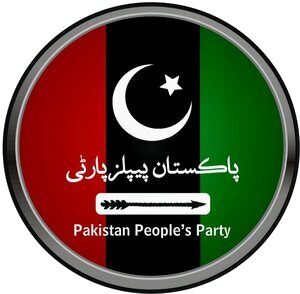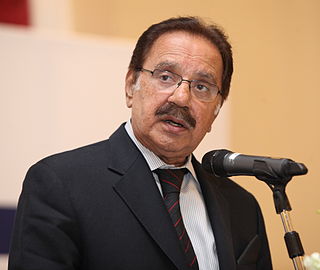| |||||
| Decades: | |||||
|---|---|---|---|---|---|
| See also: | |||||
Events from the year 1955 in Pakistan.
| |||||
| Decades: | |||||
|---|---|---|---|---|---|
| See also: | |||||
Events from the year 1955 in Pakistan.

The Pakistan People's Party is a centre-left, social-democratic political party in Pakistan. It is currently the second-largest party in the Senate. The party was founded in 1967 in Lahore, when a number of prominent left-wing politicians in the country joined hands against the military rule of president Muhammad Ayub Khan, under the leadership of Zulfikar Ali Bhutto. It is affiliated with the Socialist International. The PPP's platform was formerly socialist, and its stated priorities continue to include transforming Pakistan into a social-democratic state, promoting egalitarian values, establishing social justice, and maintaining a strong military. The party, alongside the Pakistan Muslim League-Nawaz and the Pakistan Tehreek-e-Insaf, is one of the three largest political parties of Pakistan.

The Parliament of Pakistan is the supreme legislative body of the Islamic Republic of Pakistan. It is a bicameral federal legislature, composed of the President of Pakistan and two houses: the Senate and the National Assembly. The president, as head of the legislature, has the power to summon or prorogue either house of the Parliament. The president can dissolve the National Assembly, only on the Prime Minister's advice.

Asif Ali Zardari is a Pakistani politician who is the president of Pakistan Peoples Party Parliamentarians and was the co-chairperson of Pakistan People's Party. He served as the 11th president of Pakistan from 2008 to 2013, the first president born after Independence. He is the widower of twice-elected Prime Minister of Pakistan Benazir Bhutto. He has been a member of the National Assembly of Pakistan since August 2018.
Mumtaz Ali Khan Bhutto, was a Pakistani politician who served as 8th Governor of Sindh and later the 13th Chief Minister of Sindh. He was also the first cousin of late Zulfiqar Ali Bhutto, who was the Prime Minister of Pakistan from 1973 to 1977.

Makhdoom Muhammad Ameen Faheem was a Pakistani populist left-wing figure and a poet. He was the senior vice-chairman of Pakistan Peoples Party, chairman of Pakistan People's Party Parliamentarians and former chairman of Alliance for Restoration of Democracy.
Events from the year 2008 in Pakistan.
The Zardari family is a Pakistani political family which currently holds the chieftaincy of the Sindhi-Baloch Zardari tribe. It owns thousands of acres of land in the Sakrand Taluka, Shaheed Benazirabad District, Sindh, especially in the Fatohal Zardari and Balu Ja Quba villages. The family heads the Zardari tribe, which is a Sindhi-Baloch.

An indirect presidential election was held on 6 September 2008 in Pakistan. The Electoral College of Pakistan – a joint sitting of the Senate, National Assembly and Provincial Assemblies – elected a new president after the resignation of President Pervez Musharraf. As required by the constitution, Muhammad Mian Soomro automatically became acting president on 18 August 2008, upon the resignation of Musharraf. The constitution required that a new president be elected by Parliament within 30 days; Soomro was considered loyal to Musharraf, and it was considered certain that he would be replaced in that election.
Events from the year 2009 in Pakistan.

After the dismissal of Benazir Bhutto's first government on 6 August 1990 by President Ghulam Ishaq Khan on grounds of corruption, the government of Pakistan issued directives to its intelligence agencies to investigate the allegations. After the fourth national elections, Nawaz Sharif became the Prime Minister and intensified prosecution proceedings against Bhutto. Pakistani embassies through Western Europe—in France, Switzerland, Spain, Poland and Britain—were directed to investigate the matter. Bhutto and her husband faced a number of legal proceedings, including a charge of laundering money through Swiss banks. Though never convicted, her husband, Asif Ali Zardari, spent eight years in prison on similar corruption charges. After being released on bail in 2004, Zardari suggested that his time in prison involved torture.
Events from the year 2010 in Pakistan.
Asif is an Arabic masculine given name. In Persian and Urdu it is often pronounced as 'Asif' or 'Asef' though the original form is 'Asaf'. This name referred to Solomon's vizier in the Islamic tradition, and by extension to a wise, prudential figure. It was originally borrowed from the Hebrew name Asaf (אסף) meaning "gather, harvest"
Events in the year 2011 in Pakistan.
Pir Karam Ali Shah was a Pakistani politician who served as governor of Gilgit-Baltistan. He was appointed governor on January 26, 2011, by President of Pakistan, Asif Ali Zardari.
Events in the year 2012 in Pakistan.
The family of head of state and government in Pakistan is an unofficial title for the family of the head of state or head of government of a country. In Pakistan, the term First Family usually refers to the head of state or head of government, and their immediate family which comprises their spouse and their descendants. In the wider context, the First Family may comprise the head of state or head of government's parents, siblings and extended relatives.
Events in the year 2013 in Pakistan.

Presidential elections were held on 30 July 2013 in Pakistan to elect the 12th President of Pakistan. Incumbent President Asif Ali Zardari’s term was scheduled to expire on 8 September 2013; and as such, Article 41 of the Constitution of Pakistan required the elections to be held no later than 8 August 2013. The Electoral College of Pakistan – a joint sitting of the Senate, National Assembly and Provincial Assemblies – were tasked with electing a new president to succeed President Zardari, who declined to seek a second term in office. After the Pakistan Peoples Party and its allies boycotted the presidential election, the two candidates were Mamnoon Hussain backed by the Pakistan Muslim League (N), and Wajihuddin Ahmed backed by Pakistan Tehreek-e-Insaf. Agra-born Hussain was elected president by a majority securing 432 votes. The elections were the first time in Pakistani history where a civilian president was elected while an incumbent civilian President was still in office, completing a historic and democratic transition of power that began with the 2013 General Elections.

Bakhtawar Bhutto-Zardari is a Pakistani public figure and educationist. She is the chairperson of SZABIST. She is the daughter of former Prime Minister Benazir Bhutto and former President Asif Ali Zardari, sister of incumbent Foreign Minister Bilawal Bhutto Zardari, and granddaughter of former Prime Minister Zulfikar Ali Bhutto, making her a member of the politically prominent Bhutto family of Pakistan. She is also a trustee of SZABIST Foundation, and Sindh Peoples Welfare Trust.